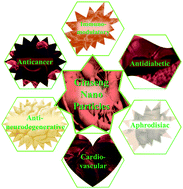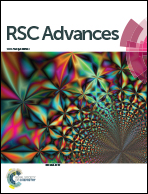Recent trends of nano bioactive compounds from ginseng for its possible preventive role in chronic disease models
Abstract
Ginseng medicine is popular around the world due to its medicinal properties including its anticancer, antidiabetic, and immunomodulatory effects as well as its contribution to stress relief. From ancient to modern times, medicinal ginseng has been proven to enhance immune function and cognition, and the bioactive compounds in ginseng, including ginsenosides, saponins, flavonoids, polyphenols and volatile oils, greatly contribute to its health benefits. Several in vitro studies have found that ginsenosides such as Rg3, Rb1, Rh1, Rh2, and Ro as well as polyphenols have a relatively high anticancer and immune response activity. However, bioavailability of these bioactive compounds was slightly lower due to modifications in the gastro-intestinal environment. It is important to improve the bioavailability of these compounds, and this can be achieved by using nanotechnology to develop carrier delivery techniques for the bioactive compounds. The bioactive compounds in ginseng can be structurally modified in the nanometer regime to improve the bioactivity, including the anticancer, immunomodulatory, antidiabetic effects in addition to the activity against neurological disorders. Nano-sized ginseng particles are a very effective treatment against various diseases because they have a higher bioavailability, improved systemic circulation and lower toxicity. Therefore, the use of nano ginseng is expected to be effective against various types of disease in the future. This study thus focuses on recent progress and prospects on nano sizing crude ginseng extracts or pure bioactive compounds and various nano carrier delivery techniques for ginsenosides, including their bioavailability for treatment against various diseases.


 Please wait while we load your content...
Please wait while we load your content...